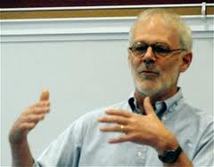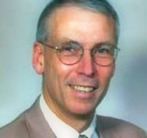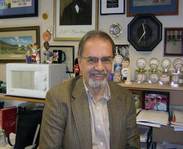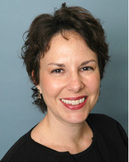The following scholars are noted as preeminent researchers and theorists in the field of Writing Center Theory and Practice. Their work, published prior to 2009, serves as an ideological foundation for most of the articles we are arguing to be included in The Norton Book of Composition Studies.
John Trimbur

"Multiliteracies, Social Futures, and Writing Centers"
My guess is that writing centers will more and more define themselves as multiliteracy centers. Many are already doing so -- tutoring oral presentations, adding online tutorials, offering workshops in evaluating web sources, being more conscious of document design. To my mind, the new digital literacies will increasingly be incorporated into writing centers not just as sources of information or delivery systems for tutoring but as productive arts in their own right, and writing center work will, if anything, become more rhetorical in paying attention to the practices and effects of design in written and visual communication -- more product oriented and perhaps less like the composing conferences of the process movement. (2000)
My guess is that writing centers will more and more define themselves as multiliteracy centers. Many are already doing so -- tutoring oral presentations, adding online tutorials, offering workshops in evaluating web sources, being more conscious of document design. To my mind, the new digital literacies will increasingly be incorporated into writing centers not just as sources of information or delivery systems for tutoring but as productive arts in their own right, and writing center work will, if anything, become more rhetorical in paying attention to the practices and effects of design in written and visual communication -- more product oriented and perhaps less like the composing conferences of the process movement. (2000)
Stephen M. North

"The Idea of a Writing Center"
Writers come looking for us because, more often than not, they are genuinely, deeply engaged with their material, anxious to wrestle it into the best form they can: they are motivated to write. If we agree that the biggest obstacle to overcome in teaching anything, writing included, is getting learners to decide that they can learn, then what a writing center does is cash in on motivation that the writer provides. (1987)
Writers come looking for us because, more often than not, they are genuinely, deeply engaged with their material, anxious to wrestle it into the best form they can: they are motivated to write. If we agree that the biggest obstacle to overcome in teaching anything, writing included, is getting learners to decide that they can learn, then what a writing center does is cash in on motivation that the writer provides. (1987)
Elizabeth Boquet and Neal Lerner
|
"Reconsiderations: After 'The Idea of a Writing Center'"
It will take all of us invested in literacy education, in all of our settings, to maximize the potential of these exciting new opportunities. Our field can no longer afford, if it ever could, to have forged a separate peace between classroom and nonclassroom teaching. There is no separate but equal. Few sites are as rich with promise for understanding the everyday practices that students bring to their academic writing as the writing centers on our very own campuses. (2008) |
Peter Carino

"Computers in the Writing Center: A Cautionary History"
Just as students have to learn to negotiate material culture, they will need to do the same in cyber culture. This is not to say technology will not generate change, but as it does and as we develop pedagogy to respond, we should remember with Joseph Weizenbaum that "rejection of direct experience was to become one of the principal characteristics of modern science." Granted direct experience is not always welcome living in a house, a product of many technologies, is as sensible as it is comfortable. Likewise, accessing a writing center tutor via computer to avoid walking across a dark campus at night is an intelligent decision. Nevertheless, we should maintain, as Michael Spooner does, that "flesh and blood is richer stuff than fiber optics." If OWLS are going to carry us into flight rather than eat us like rodents, if MOOs are going to produce more milk than dung, if we are going to cruise the information superhighway without becoming roadkill, we will need to remain vigilant against the intoxication of our enthusiasm. (2008)
Just as students have to learn to negotiate material culture, they will need to do the same in cyber culture. This is not to say technology will not generate change, but as it does and as we develop pedagogy to respond, we should remember with Joseph Weizenbaum that "rejection of direct experience was to become one of the principal characteristics of modern science." Granted direct experience is not always welcome living in a house, a product of many technologies, is as sensible as it is comfortable. Likewise, accessing a writing center tutor via computer to avoid walking across a dark campus at night is an intelligent decision. Nevertheless, we should maintain, as Michael Spooner does, that "flesh and blood is richer stuff than fiber optics." If OWLS are going to carry us into flight rather than eat us like rodents, if MOOs are going to produce more milk than dung, if we are going to cruise the information superhighway without becoming roadkill, we will need to remain vigilant against the intoxication of our enthusiasm. (2008)


